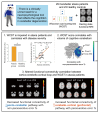Impaired cognitive flexibility and disrupted cognitive cerebellum in degenerative cerebellar ataxias
- PMID: 38454963
- PMCID: PMC10919478
- DOI: 10.1093/braincomms/fcae064
Impaired cognitive flexibility and disrupted cognitive cerebellum in degenerative cerebellar ataxias
Abstract
There is a clinically unmet need for a neuropsychological tool that reflects the pathophysiology of cognitive dysfunction in cerebellar degeneration. We investigated cognitive flexibility in degenerative cerebellar ataxia patients and aim to identify the pathophysiological correlates of cognitive dysfunction in relation to cerebellar cognitive circuits. We prospectively enrolled degenerative cerebellar ataxia patients with age-matched healthy controls who underwent 3 T 3D and resting-state functional MRI. All 56 participants were evaluated with the Scale for Assessment and Rating of Ataxia and neuropsychological tests including the Wisconsin Card Sorting Test, Trail Making Test, Montreal Cognitive Assessment and Mini-Mental State Examination. From MRI scans, we analysed the correlation of whole-brain volume and cortico-cerebellar functional connectivity with the Wisconsin Card Sorting Test performances. A total of 52 participants (29 ataxia patients and 23 healthy controls) were enrolled in this study. The Wisconsin Card Sorting Test scores (total error percentage, perseverative error percentage, non-perseverative error percentage and categories completed), Trail Making Test A and Montreal Cognitive Assessment were significantly impaired in ataxia patients (P < 0.05) compared to age-matched healthy controls. The Wisconsin Card Sorting Test error scores showed a significant correlation with the ataxia score (P < 0.05) controlling for age and sex. In volumetric analysis, the cerebellar right crus I, II, VIIb and VIII atrophy correlated with non-perseverative error percentage in the ataxia group. In functional connectivity analysis, the connectivity between crus I, II and VIIb of the cerebellum and bilateral superior parietal and superior temporal gyrus was significantly altered in ataxia patients. The functional connectivity between left crus II and VIIb of the cerebellum and dorsolateral prefrontal and superior frontal/parietal cortices showed a positive correlation with perseverative error percentage. The connectivity between left crus VIIb and pontine nucleus/middle cerebellar peduncle showed a significant negative correlation with non-perseverative error percentage in the ataxia group. The impaired cognitive flexibility represented by the Wisconsin Card Sorting Test was significantly impaired in degenerative cerebellar ataxia patients and correlated with disease severity. The Wisconsin Card Sorting Test performance reflects hypoactivity of the cognitive cerebellum and disrupted cortico-cerebellar connectivity in non-demented patients with degenerative cerebellar ataxia.
Keywords: Wisconsin Card Sorting Test; clinical biomarker; cognitive cerebellum; cognitive flexibility; degenerative cerebellar ataxia.
© The Author(s) 2024. Published by Oxford University Press on behalf of the Guarantors of Brain.
Conflict of interest statement
The authors report no competing interests.
Figures





References
-
- Orsi L, D'Agata F, Caroppo P, et al. Neuropsychological picture of 33 spinocerebellar ataxia cases. J Clin Exp Neuropsychol. 2011;33(3):315–325. - PubMed
-
- Kawai Y, Suenaga M, Watanabe H, Sobue G. Cognitive impairment in spinocerebellar degeneration. Eur Neurol. 2009;61(5):257–268. - PubMed
-
- Giocondo F, Curcio G. Spinocerebellar ataxia: A critical review of cognitive and socio-cognitive deficits. Int J Neurosci. 2018;128(2):182–191. - PubMed
LinkOut - more resources
Full Text Sources
